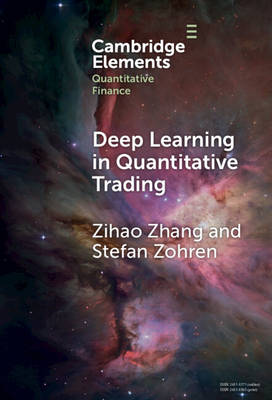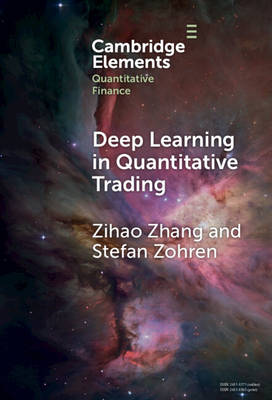
- Afhalen na 1 uur in een winkel met voorraad
- Gratis thuislevering in België vanaf € 30
- Ruim aanbod met 7 miljoen producten
- Afhalen na 1 uur in een winkel met voorraad
- Gratis thuislevering in België vanaf € 30
- Ruim aanbod met 7 miljoen producten
Zoeken
Omschrijving
This Element provides a comprehensive guide to deep learning in quantitative trading, merging foundational theory with hands-on applications. It is organized into two parts. The first part introduces the fundamentals of financial time-series and supervised learning, exploring various network architectures, from feedforward to state-of-the-art. To ensure robustness and mitigate overfitting on complex real-world data, a complete workflow is presented, from initial data analysis to cross-validation techniques tailored to financial data. Building on this, the second part applies deep learning methods to a range of financial tasks. The authors demonstrate how deep learning models can enhance both time-series and cross-sectional momentum trading strategies, generate predictive signals, and be formulated as an end-to-end framework for portfolio optimization. Applications include a mixture of data from daily data to high-frequency microstructure data for a variety of asset classes. Throughout, they include illustrative code examples and provide a dedicated GitHub repository with detailed implementations.
Specificaties
Betrokkenen
- Auteur(s):
- Uitgeverij:
Inhoud
- Aantal bladzijden:
- 184
- Taal:
- Engels
- Reeks:
Eigenschappen
- Productcode (EAN):
- 9781009707121
- Verschijningsdatum:
- 30/10/2025
- Uitvoering:
- Hardcover
- Formaat:
- Genaaid
- Afmetingen:
- 152 mm x 229 mm
- Gewicht:
- 417 g

Alleen bij Standaard Boekhandel
+ 225 punten op je klantenkaart van Standaard Boekhandel
Beoordelingen
We publiceren alleen reviews die voldoen aan de voorwaarden voor reviews. Bekijk onze voorwaarden voor reviews.







